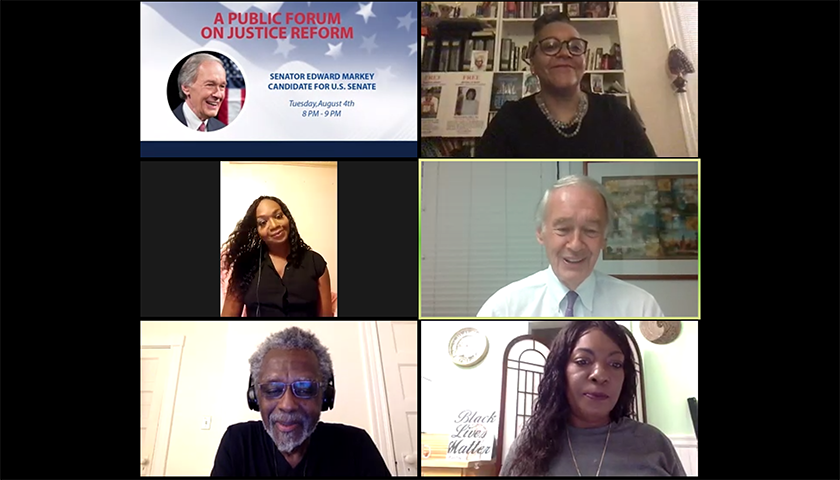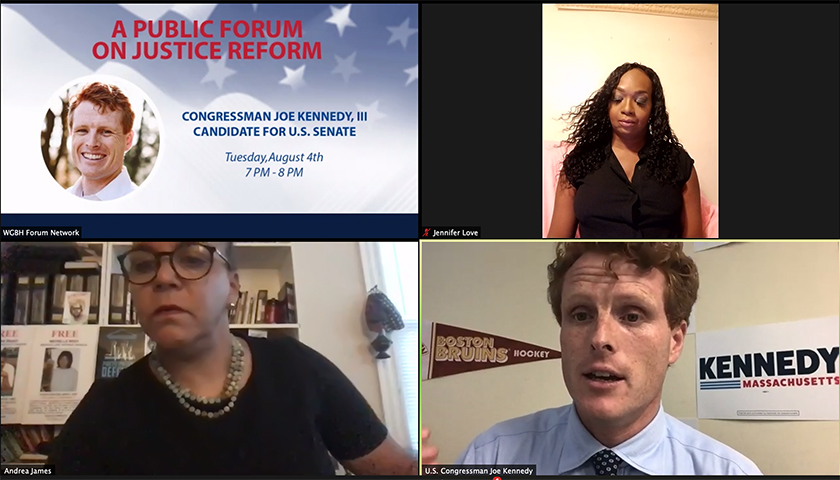Formerly Incarcerated People Grill Politicians on Justice Reform

In a unique forum driven by questions from formerly incarcerated people, Democratic candidates for U.S. Senate Joe Kennedy III and Edward Markey appeared to agree on issues ranging from abolishing solitary confinement to legalization of sex work and prioritizing community programs over prisons.
These positions also put them in in sync with the activist panelists conducting the virtual forum on justice reform, people whose lives have been most directly affected by the justice system through their experiences with incarceration. They presented the same set of questions to both Congressman Kennedy and Sen. Markey during back-to-back sessions presented through a collaboration among the Ford Hall Forum at Suffolk University, the Justice Reform Coalition, and the WGBH Forum Network.
Andrea James, founder of Families for Justice as Healing and founder and executive director of the National Council for Incarcerated and Formerly Incarcerated Women and Girls, moderated the discussions.
Keeping families intact
Citing the case of a woman who died of Covid-19 a month after giving birth in federal prison, Romilda Pereira said that this mother’s “26-month drug sentence turned into a death sentence” and asked the candidates whether they will support a federal alternative sentencing bill for parents, to be introduced shortly. Both said they will support the legislation
“Children and families must be kept together at all costs,” said Markey. “We need to ensure that we deal with the reality that [incarceration] many times has a profound impact on children. That’s why the whole policy right now should be compassionate release” if there’s any risk of exposure to COVID-19.
Kennedy said: “Our system needs to do more to recognize the lived reality and experiences of families that are subject to the criminal justice system” in order to avoid breaking up families and sending children into foster care.
Media
Life without parole
While both Markey and Kennedy agreed that sentences of life without parole should be abolished, Kennedy, born decades after assassins took the lives of his grandfather Robert F. Kennedy and great-uncle John F Kennedy, said he has wrestled with the issue.
“The man who killed a member of my own family is still currently incarcerated, but he was given an option for parole,” said Kennedy. “I recently came out in favor of ending life without parole sentences for everybody. …I do think it’s important for the voices of victims and victims’ families to be heard in those parole hearings.”
Said Markey: "We do have to create a world where everyone has a chance to redeem themselves, to show that they can reenter into society,” said Markey. “We have an over-incarceration problem in our country. …If people are incarcerated there has to be a hope for parole. There has to be a reason to live, and ultimately I believe that we should be a model for creating that kind of a system in Massachusetts.”

Investing in prevention
When questioned by Jurrell Laronal about Massachusetts’ investing in prisons—including a proposed $50 million women’s prison—rather than in communities, Markey said: “We need to move from incarceration to education. We need to find a way to reduce the number of women behind bars.”
Kennedy said that it is important to “prevent incarceration in the first place,” saying that is why he has focused on access to mental and behavioral health care. Like Markey, he emphasized the need for education as well as equal and equitable child care.
War on Drugs
Both candidates lamented the toll taken by the so-called War on Drugs, and, when challenged, Markey explained that he and other Democratic representatives voted for the 1994 crime bill because, for the first time, it addressed violence against women and also included a ban on assault rifles. He said he is working to turn back its toll by cosponsoring Sen. Cory Booker’s Next Step Act, which deals with sentencing guidelines, reentry programming, prison conditions, and law enforcement training.
Kennedy said that one reason he focuses on drug treatment access is that the War on Drugs isn’t working. “You will not prosecute your way out of this issue,” he said. “Locking people up [for drug use} is not humane; it’s not just.”
Derrick Washington called in from a Massachusetts prison where he is serving a life sentence to ask whether the candidates agree that prisoners should have the right to vote. Both Kennedy and Markey believe incarcerated people should not be denied this right.
The forum also took questions from the public.
A continuing conversation
During a time when the nation is focused on criminal justice laws and revisiting the tough-on-crime stances of the 1980s and 1990s, both candidates said this was not their first conversation with incarcerated or formerly incarcerated people and that they plan to keep the exchanges going.
The following organizations were involved in presenting the forum on justice reform:
- The National Council for Incarcerated and Formerly Incarcerated Women and Girls
- Black & Pink Boston
- Citizens for Juvenile Justice
- Young Professionals Network of the Urban League of Eastern Massachusetts
- Charles Hamilton Houston Institute for Race & Justice
- Sisters Unchained
- Families for Justice as Healing
- Disability Action
- Massachusetts Against Solitary Confinement
Greg Gatlin
617-573-8428



